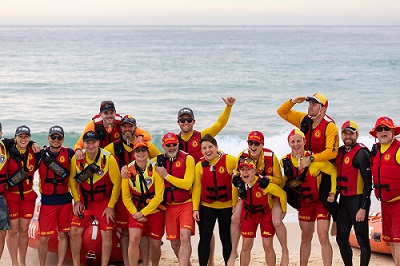IRB Training - Crew & Driver Courses

IRB Crew requires a minimum of the Bronze medallion, consists of several weeks of practical training and workbook learning. Upon successfully gaining your IRB Crew qualification, you are able to crew the IRB for patrol duties including water cover at training or carnivals.
Driver requires a minimum of IRB Crew, age 17, and a boat licence. Driver training takes place on Bronte Beach as ability to negotiate difficult or heavy swells sometimes found at Bronte is a key component of the course, and the assessment occurs in the same conditions. Upon successfully gaining your IRB Driver qualification, you are able to drive the IRB for patrol or water cover.
IRB personnel are also required to comply with the correct care and maintenance involved with such expensive pieces of equipment. Some key guidelines to ensure motors and the rhino are flushed and maintained correctly can be found here.
IRB CREW
Inflatable Rescue Boat Crew Course
For a lifesaver to obtain their IRB Crew-persons award, they must be a minimum of 15 years of age and hold the Bronze Medallion. Training usually is conducted over a number of weeks and at least 20 hours of training must be obtained before the final assessment can be sat.
Training involves both theory and practical work. IRB Crew requires a minimum of the Bronze medallion, consists of several weeks of practical training and workbook learning. Upon successfully gaining your IRB Crew qualification, you are able to crew the IRB for patrol duties including water cover at training or carnivals.
The practical work involve learning how to move around the IRB when the driver steers, patient pick up then returning the patient safely back to shore, “punching” waves, signals and holding the IRB steady before and after the IRB has left the shore for the driver.
IRB DRIVER
Inflatable Rescue Boat Driver course – incorporates the Silver medallion (IRB Driver). Members must be a minimum 16 years of age and hold Bronze Medallion and IRB Crew as well as obtaining a boat drivers’ licence from state authorities to undertake an IRB training course. The course involves a small theory component on basic outboard motor mechanics, pontoon pressure as well as set-up and dismantling procedures. This is coupled with a much larger practical component. The practical sessions require learning basic operation and manoeuvring techniques as well as gaining the ability to negotiate large, rough surf, with and without a crewman.
Other practical components include Towing, Signalling/Communications, Patient pick-up and Recovery, for example from an up-turned boat.
If you are interested in becoming part of the Bronte IRB Team please email education@brontesurfclub.com.au for when out next course is taking place.